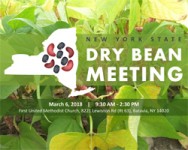Event Details
Date
March 6, 2018
Time
9:30 AM - 2:30 PM
Location
First United Methodist Church
8221 Lewiston Rd (Rt 63)
Batavia, NY 14020
Cost
$25.00 CVP enrollee
(additional attendee $25.00 ea.)
$35.00 Non-CVP enrollee
(additional attendee $35.00 ea.)
Includes lunch if pre-registered by March 1
At the Door
$25.00 CVP enrollees
$35.00 All others
Lunch cannot be guaranteed unless pre-registered.
Host
Cornell Vegetable ProgramJulie Kikkert
585-394-3977 x404
email Julie Kikkert
2018 NYS Dry Bean Meeting - Sponsorship Opportunities
March 6, 2018
Join us for research and production updates on dry bean varieties and bean breeding, weed management, Western bean cutworm, and white mold disease. A market analysis will be provided as well. We will review research priorities and gather suggestions for future educational programs. DEC recertification credits and CCA credits will be available.
Agenda Topics:
- Market analysis update - John McCreedy, New York Bean LLC
- Weed management roundtable discussion and review of industry concerns form the 2017 growing season - Julie Kikkert, CCE Cornell Vegetable Program, and John Wallace, Cornell
- Towards a durable management strategy for white mold in dry beans in NY - Sarah Pethybridge, NYS Agricultural Experiment Station, Cornell - Geneva
- Breeding, evaluation and development of dry bean varieties that are highly adapted to NYS growing environments and markets - Phil Griffiths, Cornell
- Comparison of new and standard dry bean varieties at the NYS Agricultural Experiment Station Research Farm - Jim Ballerstein, NYS Agricultural Experiment Station, Cornell - Geneva
- What's new from industry?
- Crop insurance education project update - Daniel Welch, NY FarmNet
- Cool school food: Encouraging the use of dry beans in school lunches, and promoting the health aspects of dry bean consumption - Amie Hamlin, Coalition for Healthy School Food
- The magnitude and distribution of western bean cutworm and the risk to dry bean production - Marion Zuefle, NYS IPM Program
- Report on the NYS Dry Bean Endowment for dry bean research - Shelly Vaccaro, NYSAES, Cornell - Geneva
- 2:10 PM - Adjourn educational meeting and pick up DEC certificates
- 2:15-2:30 PM - NYS Dry Bean Industry Advisory Committee Meeting - John McCreedy
This event is sponsored by New York Bean LLC.
Sponsor opportunities are available.
Questions or special needs, contact Julie Kikkert. In case of bad weather, call 585-313-8160.
Sorry, the opportunity to sponsor this event has passed.

Upcoming Events
African Eggplant Participatory Breeding Kick-Off
March 5, 2026
Join us to learn about the Cornell African Eggplant Research Project and learn how you can participate! African eggplant, also known as Bitterball, Garden Egg, Kittley and other names, is an important crop for many members of our community with heritage from regions such as sub-Saharan Africa, Southeast Asia, and Brazil. Since 2024, the Cornell African Eggplant Research Project has been collaborating with growers and community partners across New York to develop high-quality varieties adapted to the Northeast U.S. In this meeting, we will share information about growing and preparing African eggplant, highlight our research to date, and invite partners to collaborate with us in our 2026 participatory breeding and variety selection efforts.
COST: FREE! You must pre-register to receive the Zoom link.
Managing the Invasive Swede Midge Webinar
March 6, 2026
Swede midge is an invasive fly that causes serious economic losses to brassica crops. Due to its small size and hidden feeding habits, swede midge is often called an "invisible pest" and damage may be misdiagnosed. In this webinar, we will review the swede midge life cycle and crop damage symptoms, current management recommendations, new research findings, and highlights from on-farm case studies with a focus on organic management.
1.75 DEC pesticide recertification credits in categories 1a, 10, and 23.
Good Agricultural Practices (GAPs) Food Safety Training
March 10, 2026
Newark, NY
Learn about food safety on the farm! This event hosted by the Cornell Vegetable Program, Cornell Lake Ontario Fruit Team, CCE Wayne County, and the NYS Department of Agriculture, will cover good agricultural practices (GAPs) to help reduce the risk of microbial contamination on the farm, keeping food and consumers safe.


































